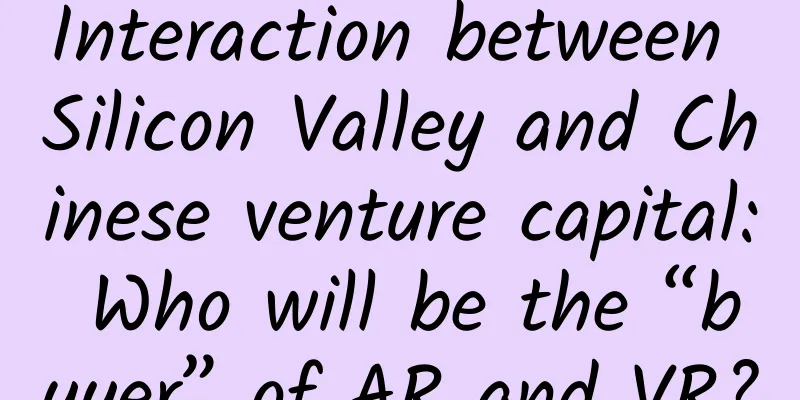Interaction between Silicon Valley and Chinese venture capital: Who will be the “buyer” of AR and VR?

|
There is no doubt that AR and VR are one of the hottest areas of technology venture capital in the past few years, especially Alibaba's $700 million lead investment in Magic Leap, which has directly hyped up the venture capital concept of AR and VR. "In Silicon Valley, VR has ceased to be a hot topic for VC investment since last year, and some funds that once claimed to invest only in VR have also changed their focus. But I remember that when I attended a domestic conference in China at the beginning of this year, I found that the enthusiasm of the domestic venture capital circle for VR was still very high at that time." Zhang Lu, an investor with Stanford background in Silicon Valley, said in an interview with the author, "Many companies in Silicon Valley have begun to contact Chinese capital, especially AR/VR companies, which is also related to the popularity of this concept in China." Silicon Valley is re-examining AR and VR technologies, a phenomenon that began as early as last year. Many Silicon Valley venture capital firms that focus on VR have adjusted their external publicity, replacing VR with "cutting-edge technology." However, in China, the pursuit of AR and VR concepts continues. "On some level, people may invest in VR as the next information carrier," said Zhang Lu. "I think we should have a correct attitude towards VR technology. Is it the next generation of information carrier technology? This is a core question." The hot VR market cannot hide the hidden concerns VR is obviously not a new concept that has only emerged in the past one or two years. In fact, four years ago or even longer, many people in Silicon Valley had their eyes on this field and were engaged in related R&D and entrepreneurship. After Facebook acquired Oculus, many entrepreneurs were inspired to move in this direction. However, VR is not a business model that can be completed by simply making a product. "VR is based on an ecosystem, and this ecosystem must be fully built before it can continue to develop and form a huge market effect." Zhang Lu believes, "A VR product must either be embedded in an ecosystem or be built into its own system. It also depends on market timing. Is it too late to start building an ecosystem now?" VR helmets are associated with an ecosystem that can support them, and only a few large manufacturers in the market can afford to build such an ecosystem. In this context, more and more VR entrepreneurs are starting to choose to make content. On the one hand, compared with hardware, content has better cross-platform advantages. On the other hand, the VR field does lack high-quality content. "I have also seen some companies that make VR content. The content quality is very good, with clarity, recognition, and the whole experience is very good." Zhang Lu said, "But the problem is that such high-quality content requires very good hardware technology to fully present the content effect, but the current VR hardware technology actually has many technical problems that have not been solved." Some key issues of VR technology itself, such as the dizziness that users feel after using it, have not yet been resolved. When the VR venture capital boom emerged, more teams tended to develop in a short-term and fast way, and the exploration of core technical issues was also losing appeal. To a certain extent, this further hindered the future development of VR technology. AR and VR are cooling down Although AR and VR are both cooling down in Silicon Valley, these two technical concepts, which are often discussed together, encounter completely different problems. "The application scenarios of AR and VR are very different," Zhang Lu said. "AR's application scenarios are wider, but AR also faces a problem of social transparency." Social transparency is one of the biggest problems faced by AR technology applications: for example, our daily chat is a very natural state, but if a person wears Google Glass, people around him will have social psychological concerns. In addition, the imagination of AR technology equipment design is also limited to the appearance of a pair of glasses to some extent, which is also a "sequelae" of Google Glass's unsuccessful promotion of the AR concept in the past few years. “Investors and entrepreneurs must think independently,” Zhang Lu told the author. “When people said VR/AR would be the ‘next big thing’, many people followed suit. But now that the market is cooling down, everyone thinks the market is over.” In her opinion, VR technology still has its own application market, but the market brought by VR technology at this stage does not need to carry so much capital. "If the total volume of a market is not large enough, but several times the capital is invested in it, then the extra capital will be wasted." She said, "I think this is the most basic investment logic that needs to be solved." "But if the key technical problems of VR can be solved in the next few years and combined with key technical content, I think there will still be a market." Zhang Lu believes that VR technology can meet people's needs for audio-visual entertainment, which is the most reasonable application scenario for VR at present. So what about the saying that "VR is the next generation of information carrier" that has always been on the lips of many venture capitalists? VR is not the next generation of information carrier VR is the next generation of information carrier, which is a major investment logic for many venture capitalists when they invest in the VR field. This logic has huge imagination and almost unlimited "storytelling" space. "When investing in VR, many investors have already viewed it as the next-generation information carrier, which has caused it to be overheated to some extent," said Zhang Lu. "In Silicon Valley, we have actually seen and invested in some technologies that have obvious potential to become the next-generation information carrier, so we will also make a more ideal view of VR/AR technology through horizontal comparison." “But I don’t think VR will become the next generation of information carrier, but it will become a very promising industry because it is large in size and has great application prospects in entertainment and other fields. At this stage, the application scenarios of VR are limited and cannot carry the application level that an information carrier should have. For example, compared with current smartphones, it still has high limitations.” As a winner of Toutiao's Qingyun Plan and Baijiahao's Bai+ Plan, the 2019 Baidu Digital Author of the Year, the Baijiahao's Most Popular Author in the Technology Field, the 2019 Sogou Technology and Culture Author, and the 2021 Baijiahao Quarterly Influential Creator, he has won many awards, including the 2013 Sohu Best Industry Media Person, the 2015 China New Media Entrepreneurship Competition Beijing Third Place, the 2015 Guangmang Experience Award, the 2015 China New Media Entrepreneurship Competition Finals Third Place, and the 2018 Baidu Dynamic Annual Powerful Celebrity. |
<<: Come and see these high-tech trucks that are no longer just big
>>: Review of mainstream active safety technologies for driverless cars
Recommend
Who decides to breathe? The mystery of the production of oxygen in the early Earth
Produced by: Science Popularization China Author:...
How to build a p2p product operation strategy from 0 to 1?
Having been in the Internet finance industry for ...
Today in Science and Technology History | 1609·8·21 The first astronomical telescope was born
Since ancient times, human beings have never stop...
How to promote and operate App?
In recent years, mobile Internet has developed ra...
Don't buy this kind of fertilizer online to grow plants! Some people got seriously ill and almost died because of it
They accidentally came into contact with the fece...
Why do some people get diarrhea when they eat spicy food, get nervous, or catch a cold? The mystery that has lasted for many years has finally been solved
Expert of this article: Wang Xiaohuan, Doctor of ...
How to choose a promotion platform? Summary of 7 information flow problems
Let’s take a look and see if you have ever encoun...
101 APP operation and promotion tools you must know
1. Operate and promote the useful information web...
Changya APP Competitive Product Analysis Report
Traditional offline KTVs can no longer meet peopl...
Google quietly launches public beta version of Chrome for iOS with 3D Touch
[[156222]] If users want to use more advanced Goo...
Why does my throat always feel like it’s “swallowing a razor blade” even though I drink a cup of coffee every day?
Ms. Zhang, a white-collar worker in Hangzhou, is ...
43 years after the eradication of smallpox, why haven’t we eliminated more infectious diseases?
Smallpox as a highly contagious disease The morta...
How do e-commerce and education industry communities attract new members?
Today I would like to share with you some of my t...
Guide to building marketing pages for the cosmetics and jewelry industries!
Do you often feel at a loss because you are not f...
Sogou advertising efficient delivery case study!
01. Insights into the thermal insulation material...









